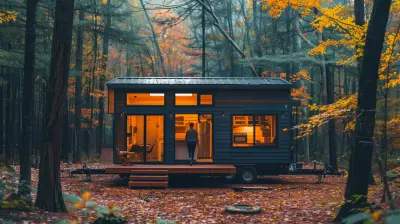Finding Value in a Frenzied Real Estate Market
18 July 2025
Let’s face it — navigating today’s real estate market can feel like diving into a jungle during feeding time. The pace is crazy, bidding wars are the norm, and buyers and sellers alike are feeling overwhelmed. If you’ve ever scrolled through listings only to watch homes disappear faster than concert tickets, you’re definitely not alone.
Still, even in a chaotic market, there’s real value to be found — for buyers, sellers, and investors. You just need the right strategy, a clear head, and some insider tips to avoid getting swept up in the frenzy.
In this post, we’ll break down how to make smart moves in an overheated housing market, so you can walk away with peace of mind and a deal that actually makes sense.
What’s Fueling the Real Estate Frenzy?
Before we dive into tactics, let’s understand what’s making everything so intense. In one word? Demand.There’s been a perfect storm of factors pushing the market into overdrive:
- Low interest rates made borrowing cheap (at least for a while).
- Limited inventory meant fewer homes for a growing pool of buyers.
- Millennials entering the market in large numbers.
- Investors snapping up properties for rentals or flips.
This combo turned many local markets into battlegrounds — where homes sell in days, and buyers are forced to offer above asking just to compete.
Sound familiar?
Now let’s talk strategy — how do you find true value when things feel inflated?
1. Take Emotions Out of the Equation
We know — easier said than done. You fall in love with a cute two-story, and next thing you know, you’re mentally hanging curtains and planning a backyard BBQ.But here’s the thing — emotional decisions drive up irrational prices. When you're emotionally attached, every home feels like “the one,” and you're more likely to overpay or ignore red flags.
Pro Tip: Treat your home buying decision like a business transaction. Would you overpay $50K for a stock in a bubble just because it “felt right”? Yeah, probably not.
2. Define Your Non-Negotiables (Before You Look)
Don’t wait until you're knee-deep in listings to figure out what matters most. Create a list of must-haves and nice-to-haves — and get real with yourself.Ask questions like:
- Do I need to be in a certain school district?
- Is a big yard truly essential or just “nice”?
- Will I survive without granite countertops?
By narrowing your scope, you avoid wasting time and energy chasing homes that won’t actually work for your lifestyle.
3. Focus on Neighborhoods with Upward Potential
We all dream of buying in the hottest zip code, but real value often hides in neighboring areas that are still under the radar.Look for:
- Areas with planned infrastructure upgrades
- Places seeing new businesses or schools pop up
- Neighborhoods on the outskirts of major growth centers
These spots may not be trendy yet, but they’re often the best place to buy low and watch your equity grow.
Think of it like investing in next year’s hottest stock, not yesterday’s winner.
4. Don’t Fear “Ugly Ducklings”
You know that outdated house with the weird paint color and shag carpet? That might be your hidden gem.In a frenzied market, the prettiest homes go fast — and for premium prices. But properties that need a little TLC? They often get overlooked and give you a chance to negotiate.
Of course, you’ve got to do the math. Cosmetic fixes? Usually worth it. Major repairs like foundation issues? Tread carefully.
But if you’re handy or have the budget to hire help, a fixer-upper can be your ticket to instant equity.
5. Act Fast, But Not Foolish
Yes, speed matters right now. Good homes don’t sit for long.But moving fast doesn’t mean skipping homework. Always:
- Get a pre-approval letter in hand
- Review comps (comparable sales) to verify the home’s price
- Read all the fine print before making offers
And don’t be afraid to walk away if something doesn’t feel right. Another house will come — even if it doesn't seem like it in the moment.
6. Consider Off-Market and Pocket Listings
In tight markets, not every deal gets posted online. Some agents — especially in hot areas — know about homes for sale before they hit the public eye.This is where working with a savvy real estate agent pays off, big time.
Let them know you’re open to off-market properties, FSBO (for-sale-by-owner) deals, and pocket listings. It might take a little patience, but these hidden gems avoid bidding wars and might save you thousands.
7. For Sellers: Don’t Be Greedy in a Hot Market
If you’re selling, it’s tempting to swing for the fences — price high and expect buyers to bite. But overpricing can actually backfire.An overpriced home sits longer, which makes buyers wonder what’s wrong with it. Eventually, you may need to drop the price and settle for less than you could’ve gotten with a realistic listing.
Here’s a better move: Price it slightly under market. You’ll attract more attention, and in many cases, start a bidding war that gets you more than you asked for anyway.
8. Run the Long-Term Numbers
Whether you’re buying a home to live in or as an investment, always ask: Does this make sense for my finances over time?Consider:
- Expected appreciation in the area
- Rental income potential (if applicable)
- How long you plan to stay
- Maintenance and repair costs
Buying just because prices are rising is like chasing a shooting star. It might look pretty for now, but it’s hard to catch, and you may get burned.
Smart buyers and investors play the long game.
9. Think Like an Investor (Even If You're Not One)
In a hot market, everyone becomes part real estate speculator — whether they like it or not. So start thinking like one.Ask yourself:
- What’s the ROI (return on investment) of this purchase?
- Could I rent this out if I had to move?
- How easy would it be to resell?
Viewing a home as both shelter and asset helps you avoid overpriced properties and find real value.
10. Use Data to Cut Through the Noise
Don’t get swept up in hype — get analytical. Thanks to the internet, there are tons of tools to help you spot trends, track pricing, and compare markets.Look at:
- Historical sale prices
- Days on market stats
- Local economic indicators
- School rankings
Numbers don’t lie. They tell you if a home is fairly priced or way off the mark.
11. Don’t Do It Alone
This one’s huge. In a frenzied market, you need a team — not just a dream.That means:
- A top-notch real estate agent who knows the local game
- A sharp lender who can lock in financing fast
- A dependable inspector who can catch costly issues
Trying to DIY the buying or selling process in this market is like walking a tightrope blindfolded. Don’t go it alone.
12. Keep Calm and House Hunt On
Let’s be honest — it’s stressful out there. The real estate market has gone from a calm cruise to an episode of Survivor.Homes go fast. Prices climb. People panic.
But if you stay focused, stay educated, and stick to your plan, you'll be in a much better spot than the average buyer or seller.
Remember: Real value isn't just about snagging a home in a hot market. It's about making a decision you won’t regret in 5, 10, or 15 years.
Final Thoughts
Finding value in this frenzied real estate market isn’t about jumping into the chaos. It’s about stepping back, assessing your goals, and outsmarting the madness with a calm, calculated approach.Whether you’re buying your first home, selling your fifth, or investing in your next income property, the key is to tune out the noise and trust the data, your instincts, and your team.
The frenzy may be real — but with the right moves, you can still find incredible opportunities and build long-term wealth.
Because in every wild market, there are winners. Let’s make sure you’re one of them.
all images in this post were generated using AI tools
Category:
Real Estate MarketAuthor:

Lydia Hodge
Discussion
rate this article
2 comments
Amira McLoughlin
Great insights! It’s fascinating how value can still be found amidst the chaos of the market. I’m curious to learn more about unconventional strategies that buyers are using right now!
November 23, 2025 at 3:41 AM

Lydia Hodge
Thank you! Unconventional strategies include focusing on emerging neighborhoods, leveraging data analytics for investment trends, and considering properties that may need renovations for added value. Happy to share more insights!
Peter Hubbard
In a frenzied real estate market, identifying value requires keen analysis of location trends, property condition, and market timing. Investors should prioritize due diligence and leverage local insights to uncover hidden gems amidst competitive bidding wars.
July 29, 2025 at 2:34 AM

Lydia Hodge
Absolutely! Thorough analysis and local insights are essential for uncovering value in such a competitive market. Prioritizing due diligence can truly make a difference for investors.


